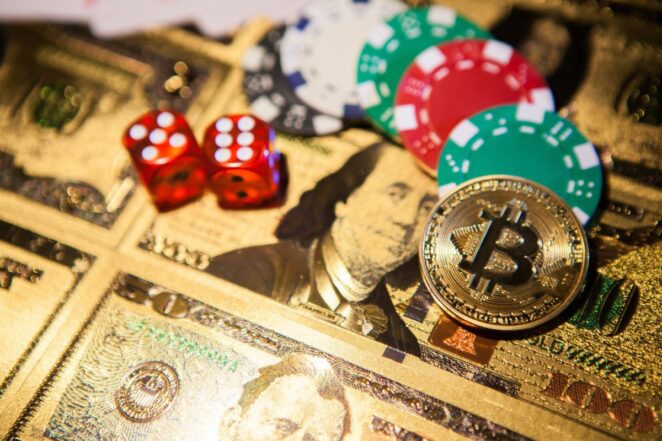Decentralized casinos are a hot topic in the online gambling industry, with many touting their potential benefits over traditional online casinos. Using blockchain technology, decentralized casinos offer a new level of security, transparency, and fairness, allowing players to trust the system without needing third-party intermediaries.
However, like any new technology, decentralized casinos also have drawbacks and limitations that must be considered. In this article, we’ll explore the pros and cons of decentralized casinos and examine how they differ from traditional online casinos.
Whether you’re a seasoned gambler or just curious about the latest trends in online gaming, this article will provide you with the information you need to decide whether decentralized casino are right for you.
Traditional Vs. Crypto Casinos: What Is the Difference?
The main difference between traditional online casinos and bitcoin/crypto casinos lies in the method of payment and the underlying technology used.
Traditional online casinos typically accept payments through credit cards, bank transfers, and other fiat-based payment methods. These transactions are processed by third-party payment providers, which can introduce delays, fees, and potential security issues.
Because cryptocurrencies are not subject to the same regulations as traditional currencies, players can enjoy faster transaction times, lower fees, and higher privacy. On the other hand, bitcoin/crypto casinos allow players to make payments using cryptocurrencies such as Bitcoin, Ethereum, and others. These transactions are recorded on a decentralized and immutable blockchain, which provides a high level of transparency and security.
In terms of the games, both types of casinos offer similar games, such as slots, table games, and live dealer games. However, crypto casinos may also offer games exclusively designed for cryptocurrency users, such as “provably fair” games that use blockchain technology to ensure that the game outcomes are truly random and cannot be manipulated by the casino.
Only some bitcoin/crypto casinos are fully decentralized, and some may still rely on centralized servers and third-party providers for certain services. However, using blockchain technology in payment and game systems provides a new level of transparency and fairness that traditional online casinos cannot match.
The Pros of Decentralized Casinos

Greater Transparency
Decentralized casinos use blockchain technology, which provides a transparent and set record of all transactions and game outcomes. This transparency ensures that players can trust the games’ fairness and the casino’s integrity.
Enhanced Security
The decentralized nature of blockchain technology makes it much more difficult for hackers to compromise the system, providing a higher level of security for both players and the casino.
Lower Fees
Because decentralized casinos don’t rely on third-party payment providers, they can offer lower transaction fees than traditional online casinos.
Faster Transaction Times
Blockchain transactions are typically faster than traditional payment methods, allowing players to make deposits and withdrawals more quickly.
Greater Privacy
Decentralized casinos typically offer more anonymity for players, as they don’t require players to provide personal information to create an account.
The Cons of Decentralized Casinos

Limited Game Selection
Because decentralized casinos are still a relatively new phenomenon, they may not offer as wide a selection of games as traditional online casinos.
Lack of Regulation
Decentralized casinos are subject to different regulations than traditional online casinos, making it difficult for players to know if the casino is legitimate and trustworthy.
Volatility
Cryptocurrencies can be subject to high price volatility, making it difficult for players to know how much they are betting or winning in fiat currency.
Learning Curve
For players new to cryptocurrencies and blockchain technology, using a decentralized casino can be more complicated than using a traditional online casino.
Overall, decentralized casinos offer a range of benefits over traditional online casinos, particularly in terms of transparency, security, and privacy. However, they also have limitations and challenges that must be considered before use.
Future of Decentralized Casinos

Decentralized casinos have been gaining a lot of attention lately, and it’s not hard to see why. These platforms offer many benefits to both players and operators, including increased transparency, security, and fairness. But what does the future hold for decentralized casinos, and how will they continue to evolve in the coming years?
One of the most significant trends we can expect to see in the future of decentralized casinos is the increasing use of blockchain technology. Blockchain technology provides a secure and transparent ledger that can be used to record all transactions on the platform. This means that players can be sure that all of their bets are being handled fairly and transparently, and that operators can ensure that their platform is operating efficiently.
Another trend we can expect to see is the development of new games and betting options. Decentralized casinos are still relatively new, but as more players begin to use these platforms, there will be a growing demand for a wider range of games and betting options. Operators will need to keep up with these demands by developing new games that are fun and engaging for players, as well as providing new betting options that allow players to wager on a variety of different outcomes.
One of the most exciting possibilities for the future of decentralized casinos is the potential for these platforms to become more social. With the rise of social media and other online communities, there is a growing demand for online platforms that allow people to connect and interact with one another. Decentralized casinos could fill this void by providing a social gaming experience that allows players to interact with one another while playing their favorite games.
Of course, there are also challenges that decentralized casinos will need to overcome in order to succeed in the future. One of the biggest challenges is the need to comply with regulatory requirements. While decentralized casinos offer many benefits, they are still subject to regulation in many jurisdictions, and operators will need to ensure that they are compliant with all applicable laws and regulations.
In Summary
Decentralized casinos offer a range of benefits over traditional online casinos, including greater transparency, enhanced security, lower fees, faster transaction times, and greater privacy. However, they also have limitations and challenges, such as limited game selection, lack of regulation, volatility, and a learning curve for new users.
Decentralized casinos are still a relatively new phenomenon in the online gambling industry. Their long-term viability and impact on the industry remain to be seen. As with online gambling, players must research and exercise caution when using decentralized casinos.




